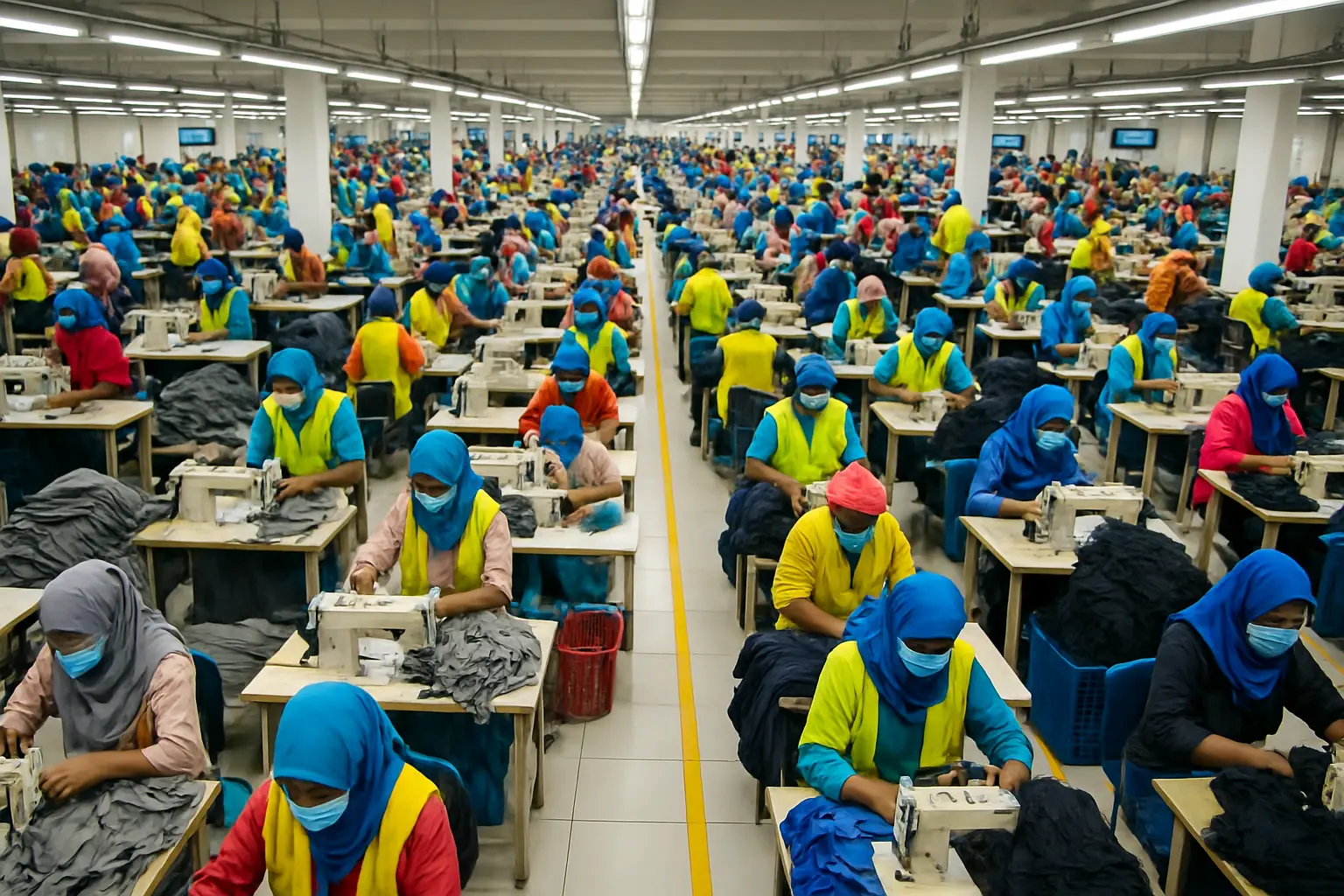
Africa is one of the fastest-growing markets for apparel, with the demand for garments rising steadily. This presents a massive opportunity for Bangladeshi RMG manufacturers to tap into the African market. However, while the potential is immense, finding reliable, verified importers in Africa can be a significant challenge. Without the right connections, it’s easy to miss out on key opportunities.
This guide outlines seven actionable strategies that can help Bangladeshi RMG manufacturers bridge the gap and establish strong connections with African buyers, paving the way for success.
Preparing Your Export Strategy for Africa
Identify Your Niche and Unique Selling Points (USPs)
Before targeting African importers, take a step back and evaluate your strengths. Whether your specialty is knitwear, denim, workwear, or eco-friendly apparel, it’s crucial to identify what you do best. Knowing your unique value proposition will allow you to focus on the specific market segments in Africa that need your products.
Understand Key African Markets
Each African region has unique demands. For example, West Africa is known for its appetite for garments and jute products, while Southern Africa is a growing hub for high-quality textiles and garments. Some of the most promising markets include South Africa, Nigeria, and Egypt, all of which have high import volumes from Bangladesh.
Create a Professional Digital Presence
In today’s globalized world, having a strong online presence is essential. A professional website with a detailed product catalog is one of the best ways to introduce your business to African buyers. This is a cost-effective method to connect with new markets and increase your visibility.
7 Actionable Ways to Connect with African Importers
1. Leverage Online B2B Marketplaces
B2B marketplaces are platforms specifically designed to connect suppliers with buyers. Using these platforms allows manufacturers to reach global markets, including Africa. Some popular platforms include TRAGOA, often referred to as the “Alibaba of Africa,” Textilepages.com, and Kingmansa. These platforms enable you to list your products and make direct connections with verified African importers.
2. Participate in International Apparel Trade Fairs
Trade fairs are an excellent way to connect with international buyers and showcase your products in person. Attending well-known African trade fairs such as allfashion sourcing in Cape Town, South Africa, Cairo Fashion & Tex in Egypt, and ASFW (Africa Sourcing & Fashion Week) in Addis Ababa, Ethiopia can provide you with direct access to African importers looking for new suppliers.
3. Utilize Government & Export Promotion Bodies
Government bodies and export promotion councils play a key role in connecting businesses with potential buyers. These organizations provide valuable resources and information on identifying the right buyers. Reach out to your country’s export promotion council to get guidance on navigating the African market.
4. Master Professional Networking on Platforms like LinkedIn
Social media platforms, especially LinkedIn, are incredibly effective tools for networking and professional connections. LinkedIn allows you to search for and connect with potential buyers in the garment industry, making it easier to establish relationships with African importers.
5. Engage with International Chambers of Commerce
Chambers of Commerce are crucial for businesses seeking international connections. These organizations have networks of importers and suppliers around the world, including in Africa. By engaging with your local Chamber of Commerce, you can gain access to a broad network of business contacts, including those in Africa.
6. Consider Partnering with Third-Party Agencies
Buying agents and foreign wholesalers are professionals who can help source products in bulk and resell them in their respective countries. These third-party agencies can be extremely beneficial for manufacturers looking to enter the African market, especially when dealing with complex logistics and regulations.
7. Develop a Direct Digital Outreach Strategy
Creating a targeted list of potential buyers and reaching out to them directly through personalized emails or messages is a highly effective strategy. Generic bulk emails often get ignored, but personalized outreach is more likely to grab attention and build trust with potential African buyers.
The Strategic Advantage: How the ABBF Streamlines Your Connection to Africa
Overcoming the Core Challenges
Despite the vast potential, connecting with African importers isn’t without challenges. High transport costs, logistical hurdles, and regulatory issues can slow down the process. Furthermore, finding reliable partners who are financially trustworthy and reputable can be a struggle.
Your Direct Link to Vetted Buyers
The Africa Bangladesh Business Forum (ABBF) is designed to solve these problems. It is a specialized platform that directly connects Bangladeshi manufacturers with verified African importers, removing the guesswork involved in finding reliable partners. By joining the ABBF, you gain access to a network of vetted buyers who are ready to do business.
How ABBF Accelerates Your Growth
Direct B2B Matchmaking: ABBF offers a B2B platform that directly matches Bangladeshi manufacturers with African buyers, ensuring a smooth and efficient connection process.
Exclusive Trade Forums: The forum organizes business forums and trade missions, where you can meet serious buyers face-to-face and build lasting relationships.
Risk Mitigation: The ABBF helps reduce the risks associated with finding new partners by ensuring that all members go through a verification process. This helps manufacturers avoid scams and partner with reputable buyers in Africa.
Call to Action
Join the Africa Bangladesh Business Forum (ABBF) today to start your export journey to Africa. With access to trade fairs, business forums, and a network of reliable partners, you will be well-equipped to grow your business and succeed in the African market.
Book a CallFrequently Asked Questions (FAQ)
Q: What is the most effective way to find my first African buyer?
A: A combination of having a strong digital presence and networking is key. Joining a specialized B2B platform like Textilepages.com or attending a major trade fair such as Cairo Fashion & Tex in Egypt are excellent ways to meet African importers.
Q: How can I verify if an African importer is legitimate?
A: Verifying buyers can be challenging. One effective method is to use services like Volza to assess creditworthiness or partner with a trusted entity like the ABBF, which vets its members to ensure legitimacy.
Q: Which regions in Africa have the most potential for trade?
A: Southern Africa and West Africa lead in trade volumes. Countries like South Africa, Nigeria, and Egypt are among the top importers of Bangladeshi garments. East Africa also shows promising activity, with rising demand for textiles and garments.
Q: What export documents are required to ship garments to Africa?
A: Most African countries require an Electronic Cargo Tracking Note (ECTN) and commercial invoices. Many buyers also ask for compliance certificates like BSCI, Accord, or Alliance before approving orders.
Q: What are the biggest challenges for Bangladeshi RMG exporters in Africa?
A: Key challenges include high shipping costs, port delays, and limited financing. Understanding local sizing and fashion trends is also important for success.
Conclusion
Connecting with African importers may seem like a daunting task, but it is entirely achievable with the right approach. Using a combination of digital platforms, attending trade fairs, and forming strategic partnerships can put your business on the path to success.
Don’t let the challenge of connecting with African importers hold you back. Join the Africa Bangladesh Business Forum (ABBF) today and gain direct access to a network of trusted African buyers ready to grow your RMG business.

